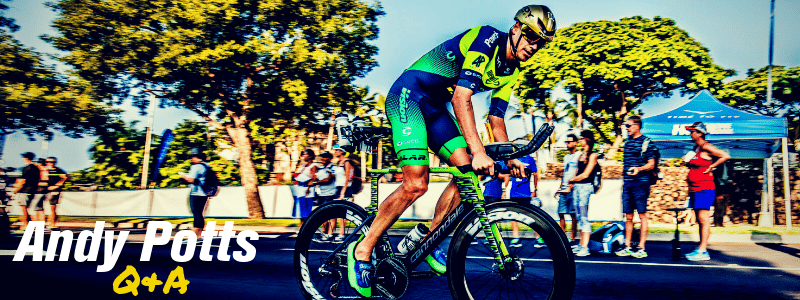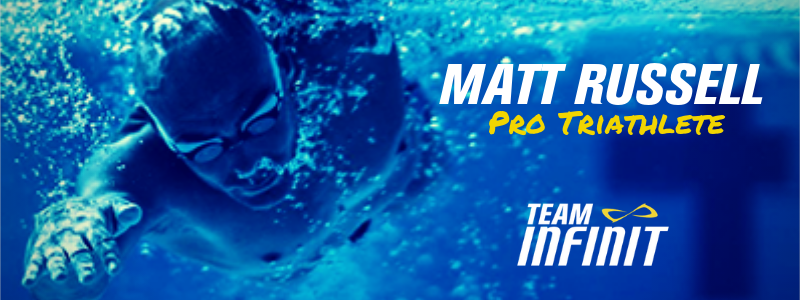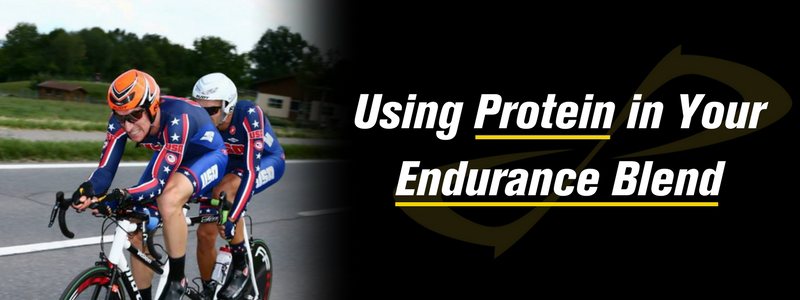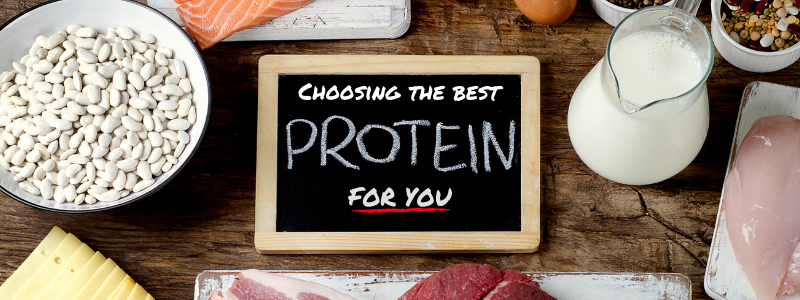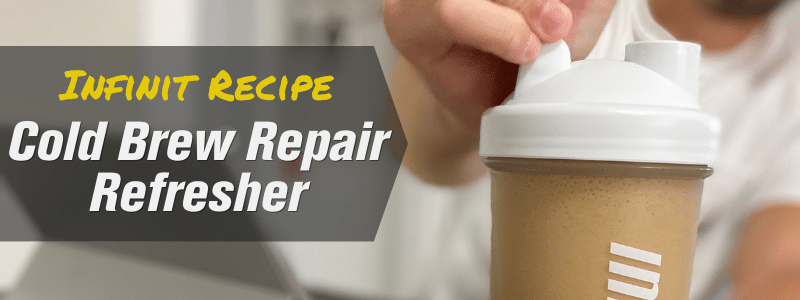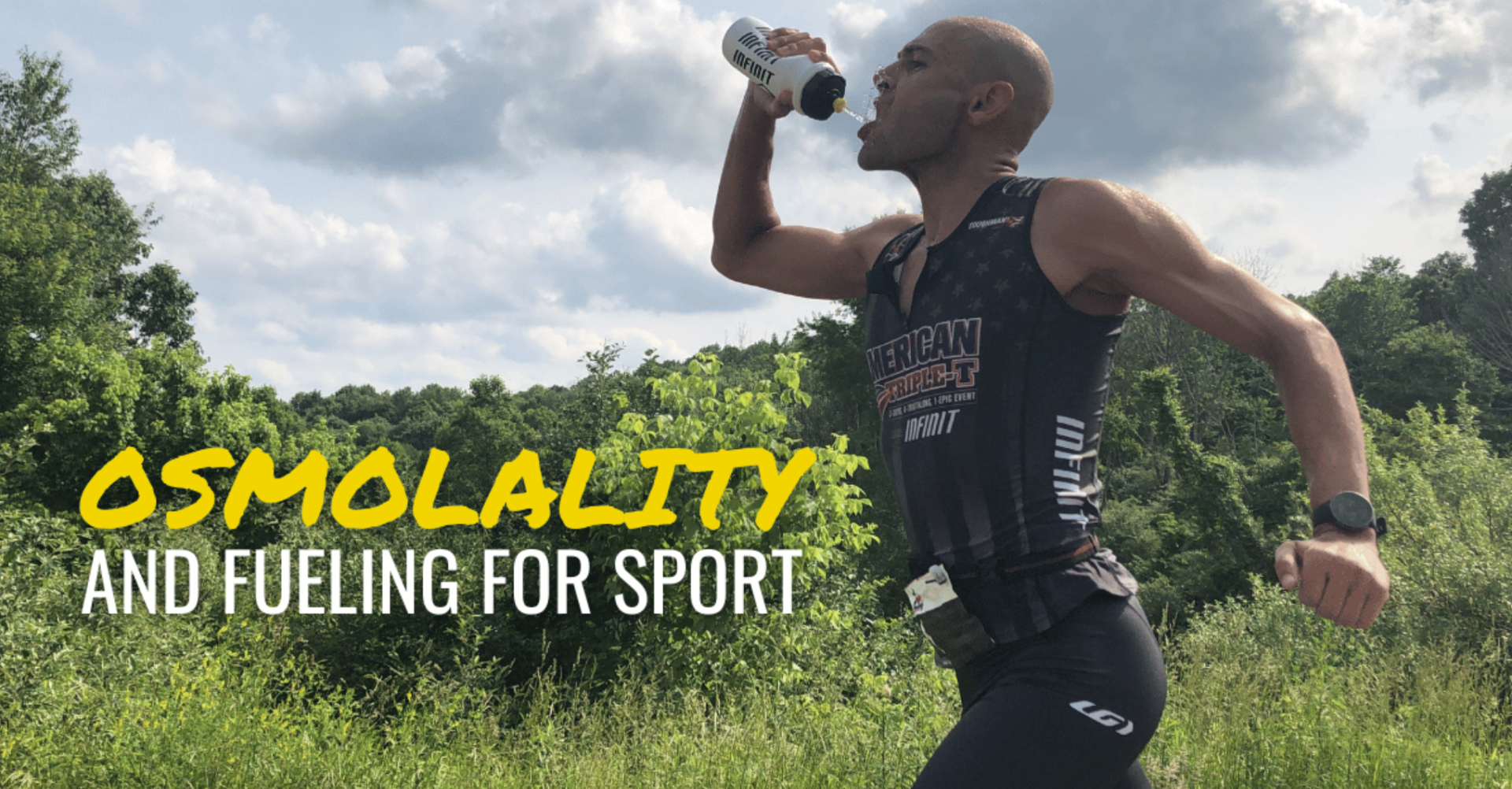8 Signs You Need More Protein
- 18 Oct 2018
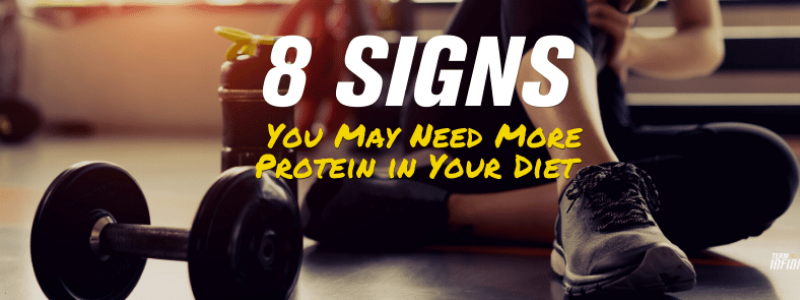
By Josie Meyer, Dietetic Intern
Protein is an essential nutrient that is present in every cell of the body and is critical to supporting athletic training. Protein is responsible for building and maintaining muscles, and is what makes up the enzymes that power all reactions in your body that keep you going.2

Proteins are made of amino acids, which are building blocks that help grow and maintain the body’s tissues. Humans are not able to synthesize (or produce internally) certain amino acids, so they need to be consumed through food. The amino acids that need to come from dietary sources are called essential amino acids.1 This inability to produce essential amino acids is why the consumption of an adequate amount of high quality protein is vital for your health, epecially as athletes.
It is recommended that average adults get a minimum of 0.8 grams of protein per kilogram of body weight per day.3 Athletes, on the other hand, should consume higher amounts due to increased needs for muscle repair and training adaptations. The Academy of Nutrition and Dietetics recommends 1.2 to 2.0 grams of protein per kilogram of body weight per day for athletes, depending on training intensity.4 If you're not consuming enough protein, your body may be giving you different signs that you need to eat more of it. Some signs that you can look for are decreased muscle growth or strength, getting sick more often, hunger, fatigue, unhealthy hair, skin, and nails, neurological disruptions, and swelling.
1. You can't seem to build muscle
Do you feel like you’re not getting the results that you want? You may not be consuming enough protein for muscle growth. When you don’t get enough protein in your diet, your body will start to take it from other sources. Primarily, it will take protein from your muscles. This will cause muscle wasting and decreased strength.2 In order to provide the optimal amount of protein and amino acids to allow your muscles to recover and build, protein intake should be spaced throughout the day and after workouts.4

2. You're getting sick more often
Are you getting sick more often than you have in the past? You could have a weakened immune system due to lack of protein in your diet. Protein is needed for the creation of antibodies, which are proteins that fight off diseases caused by pathogens that enter the body. Lack of protein can reduce the number of antibodies in your blood which can leave you defenseless to different pathogens.2
3. You can’t seem to curb your hunger cravings
Can’t seem to get full? Grab something high in protein to increase satiety. Evidence shows that if you consume higher amounts of protein it will increase fullness. Protein can also contribute to weight loss and maintenance because of this effect.6 If you notice, a meal full of carbohydrates doesn't keep you full as long as a meal filled with protein. This is because protein takes much longer to digest than carbohydrates.
4. You’re more tired than usual
Are you feeling weak and tired? You may be anemic due to the lack of hemoglobin in your blood. Hemoglobin is a protein that transports oxygen to different organs. When protein in the diet is decreased, the production of hemoglobin is also decreased. Lower hemoglobin in the blood will reduce the transport of oxygen.7 If this happens, you may experience tiredness, weakness, and shortness of breath.8 Studies show that a reduction of hemoglobin results in a reduction of VO2 max and endurance performance.9

5. Your hair, skin, and nails aren't healthy
Your hair, skin, and nails are made up of protein. It’s no surprise that when you aren't eating enough protein, they will become deficient too. Studies show that nutritional deficiency impacts hair structure and growth. Decreased protein in the diet can cause hair breakage, loss, and reduced production of pigments.10 Inadequate protein intake can cause “Beau’s lines,” grooves that run side to side along fingernails and toenails.11 Your skin can also be affected. If you're not getting enough protein in your diet, your skin can become pale, dry, flaky, and atrophied.7
6. You're feeling emotional
Decreased protein intake can actually affect the way you think and feel! Neurotransmitters are made from the building blocks of protein, amino acids. Some examples of neurotransmitters include dopamine and serotonin. Dopamine is made by the amino acid tyrosine and affects behaviors such as motivation, memory, movement regulation, and is active in the reward centers of the brain.12 Serotonin is made from the amino acid tryptophan and promotes the feeling of well-being. If tyrosine and tryptophan are not made, there will not be enough to make an adequate number of neurotransmitters.13 This may cause emotional problems like moodiness, severe depression, irritability, and insomnia.7

7. You’re experiencing abnormal swelling
Have you ever noticed swelling in different parts of your body? This could be due to lack of protein in your diet. Low protein in your blood can cause fluid to leak out of your blood vessels. This results in edema, or abnormal fluid accumulation in the body’s tissues.14 Common areas you will see swelling include the feet, hands, and stomach. Aside from the swelling, edema can cause pain in arms and legs, stained skin, hypertension, and tense joints.2
8. You can’t seem to shake that muscle soreness
Muscle soreness, some may hate it and others may love it. After all, no pain, no gain — Right? But if you’re suddenly noticing that your body feels more sore than usual, or if you’re experiencing excessive muscle soreness it could be a sign your body is unable to repair and recover itself properly.
Exercise-induced muscle soreness results from microtears. The stress from exercise that is put on the muscles disrupts the normal function and make up of the muscle. As the muscle is damaged during exercise it can feel painful, the soreness then kicks in after exercise as the body responds to the breakdown.15 Soreness could be due to a change in exercise, a new form of movement, or poor nutrition. This is a necessary part of the adaptive response that comes from exercise. Activity & the physical stress of training breaks down the body (catabolism) so that it can rebuild and recover (anabolism) so it can be better prepared for that stress next time.
Proteins and the amino acids they are made of are essential to proper muscle recovery. Many studies have looked into how effective protein is in reducing muscle soreness, and although there are mixed results, multiple studies found that postexercise protein use can reduce muscle soreness and potentially improve health.16
The specific amino acids that are found in the protein source you consume may also have an effect on reducing muscle soreness. When taken around exercise, the Branched Chain Amino Acids (BCAAs) — Leucine, Isoleucine and Valine, Glutamine, and Arginine may help to reduce muscle soreness.17
Ways to increase your protein intake:
Add an egg to sandwiches or hard-boiled eggs to salads
- Large Egg - 6g
Substitute regular pasta for protein enriched pasta
- Barilla Protein Plus Spaghetti 3.5oz - 17g
Add beans, quinoa, and lentils to any food
- ½ cup Black Beans - 7g
- ½ cup Cooked Quinoa - 4g
- ½ cup Lentils - 9g
Add peanut butter to toast, bagels, English muffins, and smoothies
- 2 Tbsp Peanut Butter - 7g
Add lean meats to soups, salads, and casseroles
- Ground Turkey 4oz - 20-26g
- Ground Chicken 4oz - 20-26g
Have Greek yogurt or cottage cheese with fruit and nuts
- 5.3oz Greek Yogurt - 15g
- ½ cup Cottage Cheese - 13g
- ¼ cup Sliced Almonds - 6g
Add protein powder or high-protein drink mixes to smoothies, water, drinks, and recipes
- :RAW Pure Protein Recovery - 20g
- MUD Pre-workout Meal Supplement - 11g
- :REPAIR Complete Recharge - 15g
- :NOCTURNE Night-time Repair - 11g
- COLD BREW Performance Coffee - 20g
About the Author
Josie Meyer is a 2018-2019 Dietetic student intern who currently is completing her final undergraduate year at the University of Cincinnati and is preparing to become a Registered Dietitian Nutritionist. INFINIT Nutrition is proud to partner with the University of Cincinnati's Coordinated Program in Dietetics (CPD) to provide our next generation of nutrition professionals an opportunity to spend time with the INFINIT Team and gain real-life experience of working at a sports nutrition company.
Resources
- “Teaching Dietary Protein Basics.” EatrightPRO - Academy of Nutrition and Dietetics, www.eatrightpro.org/practice/practice-resources/international-nutrition-pilot-project/teaching-dietary-protein-basics.
- Khan, Alamgir, et al. “Health Complication Caused by Protein Deficiency.” Allied Academies, Journal of Food Science and Nutrition, 4 Oct. 2017, www.alliedacademies.org/journal-food-science-nutrition/.
- “Dietary Reference Intakes for Energy, Carbohydrate, Fiber, Fat, Fatty Acids, Cholesterol, Protein, and Amino Acids (Macronutrients).” NUTRIENT RECOMMENDATIONS: DIETARY REFERENCE INTAKES (DRI), 2005, doi:10.17226/10490.
- Position of the Academy of Nutrition and Dietetics, Dietitians of Canada, and the American College of Sports Medicine: Nutrition and Athletic Performance Thomas D.T., Erdman K.A., Burke L.M. (2016) Journal of the Academy of Nutrition and Dietetics, 116 (3) , pp. 501-528.
- Mohr, Christopher R. “Timing Your Pre- and Post-Workout Nutrition.” Eat Right. Academy of Nutrition and Dietetics., www.eatright.org/fitness/exercise/exercise-nutrition/timing-your-pre-and-post-workout-nutrition.
- The Effects of Increased Protein Intake on Fullness: A Meta-Analysis and Its Limitations Dhillon J., Craig B.A., Leidy H.J., Amankwaah A.F., Osei-Boadi Anguah K., Jacobs A., Jones B.L., (...), Tucker R.M. (2016) Journal of the Academy of Nutrition and Dietetics, 116 (6) , pp. 968-983.
- Guoyao Wu. “Dietary Protein Intake and Human Health.” Food & Function, Royal Society of Chemistry, 11 Jan. 2016, pubs.rsc.org/en/content/articlehtml/2016/fo/c5fo01530h.
- “Protein Deficiency Anaemia.” Protein Deficiency Anaemia | World Problems & Global Issues | The Encyclopedia of World Problems, 29 Dec. 2017, encyclopedia.uia.org/en/problem/160529.
- Calbet, José A.l., et al. “Importance of Hemoglobin Concentration to Exercise: Acute Manipulations.” Respiratory Physiology & Neurobiology, vol. 151, no. 2-3, 2006, pp. 132–140., doi:10.1016/j.resp.2006.01.014.
- Guo, Emily L., and Rajani Katta. “Diet and Hair Loss: Effects of Nutrient Deficiency and Supplement Use.” Dermatology Practical & Conceptual 7.1 (2017): 1–10. PMC. Web. 16 Oct. 2018.
- De, Dipankar, and Divya Seshadri. “Nails in Nutritional Deficiencies.” Indian Journal of Dermatology, Venereology, and Leprology, vol. 78, no. 3, 2012, p. 237., doi:10.4103/0378-6323.95437.
- Washington, M. T. dopamine. McGraw-Hill Education, 2018, doi:10.1036/1097-8542.203330.
- Rao, T. S. Sathyanarayana et al. “Understanding Nutrition, Depression and Mental Illnesses.” Indian Journal of Psychiatry 50.2 (2008): 77–82. PMC. Web. 16 Oct. 2018.
- “Causes and Signs of Edema.” National Center for Biotechnology Information, U.S. National Library of Medicine, 30 Dec. 2016, www.ncbi.nlm.nih.gov/pubmedhealth/PMH0072593/.
- Proske U, Morgan DL. Muscle damage from eccentric exercise: mechanism, mechanical signs, adaptation and clinical applications. The Journal of Physiology. 2001;537(2):333-345. doi:10.1111/j.1469-7793.2001.00333.x
- Flakoll PJ, Search for more papers by this author, Judy T, et al. Postexercise protein supplementation improves health and muscle soreness during basic military training in marine recruits. Journal of Applied Physiology. https://journals.physiology.org/doi/full/10.1152/japplphysiol.00811.2003. Published March 1, 2004. Accessed October 5, 2020.
- Ohtani M, Sugita M, Maruyama K. Amino Acid Mixture Improves Training Efficiency in Athletes. The Journal of Nutrition. 2006;136(2).


